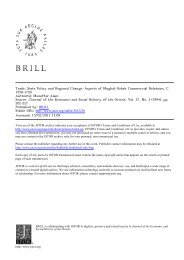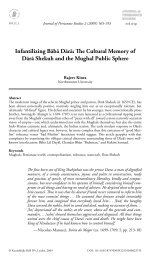The Mughals, the Sufi Shaikhs and the Formation of the Akbari ...
The Mughals, the Sufi Shaikhs and the Formation of the Akbari ...
The Mughals, the Sufi Shaikhs and the Formation of the Akbari ...
You also want an ePaper? Increase the reach of your titles
YUMPU automatically turns print PDFs into web optimized ePapers that Google loves.
FORMATION OF THE AKBARI DISPENSATION 155<br />
risen up against Akbar) arrived at Chamari, he received from <strong>the</strong><br />
Khwaja an assurance <strong>of</strong> his own victory, <strong>and</strong> <strong>the</strong> holy man’s dress as a<br />
present. Bada’uni concludes: ‘<strong>The</strong> result <strong>of</strong> this prayer was that having<br />
arrived by forced marches in Tulambah he (Husain Quli) gained<br />
a glorious victory’. 52 In 1574, however, <strong>the</strong> Khwaja left India, also<br />
according to Bada’uni, following a premonition <strong>of</strong> his fast approaching<br />
death. ‘<strong>The</strong> time <strong>of</strong> my departure is drawn nigh’, <strong>the</strong> Khwaja is<br />
reported to have said, ‘<strong>and</strong> I have been comm<strong>and</strong>ed to convey this<br />
h<strong>and</strong>ful <strong>of</strong> bones, <strong>of</strong> which I am composed, to <strong>the</strong> burying place<br />
<strong>of</strong> my ancestors in Samarq<strong>and</strong>’. He died shortly after his arrival in<br />
Samarq<strong>and</strong>. 53 However, <strong>the</strong> real reason <strong>and</strong> occasion for <strong>the</strong> Khwaja’s<br />
departure seems to have been <strong>the</strong> rapid decline <strong>of</strong> <strong>the</strong> Naqshb<strong>and</strong>is<br />
from <strong>the</strong> favour <strong>of</strong> <strong>the</strong> Emperor. To gain a clearer sense <strong>of</strong> this decline,<br />
we may examine <strong>the</strong> career <strong>of</strong> ano<strong>the</strong>r noted Naqshb<strong>and</strong>i, Sharaf al-<br />
Din Husain, who also visited Akbar’s court early in his reign.<br />
Sharaf al-Din Husain was <strong>the</strong> son <strong>of</strong> Khwaja Mu’in <strong>and</strong> a gr<strong>and</strong>son <strong>of</strong><br />
Khwaja Khaw<strong>and</strong> Mahmud. He had lived with his fa<strong>the</strong>r in Kashghar,<br />
where <strong>the</strong> latter had made a fortune as a merchant dealing in precious<br />
stones. 54 He was sent by <strong>the</strong> ruler <strong>of</strong> Kashghar to <strong>of</strong>fer condolences<br />
on <strong>the</strong> death <strong>of</strong> Humayun in 1556 <strong>and</strong> to congratulate Akbar on<br />
his accession. 55 Sharaf al-Din came with this mission accompanied<br />
by Khwaja ‘Abd al-Bari, who had earlier been sent by Humayun to<br />
Kashghar at <strong>the</strong> time <strong>of</strong> his expedition to reconquer India. Khwaja<br />
‘Abd al-Bari also belonged to ‘<strong>the</strong> noble line <strong>of</strong> <strong>the</strong> Naqshb<strong>and</strong>i<br />
Khwajas’, <strong>and</strong> we learn that he was ‘son <strong>of</strong> Khwaja ‘Abd al-Khafi,<br />
son <strong>of</strong> Khwaja ‘Abd al-Hadi, son <strong>of</strong> Khwajagan Khwaja, son <strong>of</strong> Khwaja<br />
Ahrar—may his grave be holy’. 56<br />
Now, Sharaf al-Din soon rose in eminence in <strong>the</strong> Mughal court<br />
through <strong>the</strong> influence <strong>of</strong> Maham Ananga <strong>and</strong> Adham Khan, important<br />
figures <strong>of</strong> <strong>the</strong> early years <strong>of</strong> Akbar’s reign. He received <strong>the</strong> high rank<br />
<strong>of</strong> amir, <strong>and</strong> was given jagirs in Ajmer <strong>and</strong> Nagor. During <strong>the</strong> 5th<br />
year <strong>of</strong> his reign, <strong>the</strong> Emperor gave him his half-sister Bakhshi Banu<br />
Begam in marriage. In <strong>the</strong> 7th year he was deputed to capture <strong>the</strong> fort<br />
52 Muntakhab al-Tawarikh, Vol. III, p. 40; Ma’asir al-Umara,Vol.II,p.379; Akbarnama,<br />
Vol. II, p. 127, English trans. p. 195.<br />
53 Muntakhab, p.40.<br />
54 Akbarnama, English trans., Vol. II, p. 194–5, English trans., pp. 301–2; Ma’asir<br />
al-Umara, Vol. III, p. 234. Khwaja Mu’in had <strong>the</strong> monopoly <strong>of</strong> jade trade with China.<br />
55 Akbarnama, Vol. II, p. 195, English trans., pp. 302–3; Ma’asir al-Umara, Vol. III,<br />
p. 234.<br />
56 Akbarnama, Vol.II,p.21, English trans., p. 37.<br />
http://journals.cambridge.org Downloaded: 15 Feb 2011 IP address: 129.174.97.34






